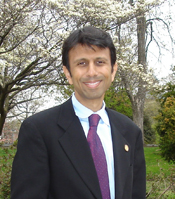Bobby Jindal: Difference between revisions
Pat Palmer (talk | contribs) |
Pat Palmer (talk | contribs) (PropDel; written in present tense) |
||
| (One intermediate revision by one other user not shown) | |||
| Line 1: | Line 1: | ||
{{PropDel}}<br><br> | |||
{{subpages}} | {{subpages}} | ||
{{Image|BobbyJindal.jpg|right|350px|Bobby Jindal}} | {{Image|BobbyJindal.jpg|right|350px|Bobby Jindal}} | ||
| Line 6: | Line 7: | ||
==Political views== | ==Political views== | ||
Jindal is very conservative, as he strongly opposes [[abortion]] and [[embryonic stem cell research]], and supported [[gun rights]], a stronger [[military]] force and stricter national security measures in response of threats of [[terrorism]]. He voted against the implementation of [[CAFTA]], the free trade agreement between U.S. and countries in Central America. | Jindal is very conservative, as he strongly opposes [[abortion]] and [[embryonic stem cell research]], and supported [[gun rights]], a stronger [[military]] force and stricter national security measures in response of threats of [[terrorism]]. He voted against the implementation of [[CAFTA]], the free trade agreement between U.S. and countries in Central America.[[Category:Suggestion Bot Tag]] | ||
Latest revision as of 07:10, 13 September 2024
| This article may be deleted soon. | ||
|---|---|---|
Piyush "Bobby" Jindal (1971- ) is an United States politician and the current governor of the state of Louisiana. He is a member of the Republican Party, and is the first non-white governor of Louisiana since Reconstruction. He was elected in 2007 and inaugurated in 2008, succeeding Democrat Kathleen Blanco. Prior to his governorship, he served in the U.S. House of Representatives. He was a Rhodes Scholar. Political viewsJindal is very conservative, as he strongly opposes abortion and embryonic stem cell research, and supported gun rights, a stronger military force and stricter national security measures in response of threats of terrorism. He voted against the implementation of CAFTA, the free trade agreement between U.S. and countries in Central America. |
||
